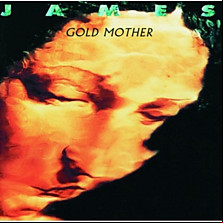BBC Review 1bj6o
For many their defining album, Gold Mother encapsulates the essence of James.
Chris Roberts 2010
James have always been an atypical fish-kettle, their career defying logic. Never household names, they’ve yet sold lorry-loads. Despite an eccentric, literate frontman, they’ve never hooked obsessives quite like Morrissey has; despite being part of the 90s dance boom they’ve never become “hallowed” like The Stone Roses. Yet for all the lingering sense that they’ve in some way underachieved, their track record is dauntingly impressive, both in of aesthetic ambition and commercial reach.
For many their defining album, and certainly their commercial breakthrough, 1990’s Gold Mother (their third) encapsulates the essence of James. It was recorded for Rough Trade, but when that label predicted optimum sales would be 30,000, the band, whose history was already complex, bought it back and signed to Fontana. It sold ten times the smaller label’s guess. Much of this was down to the runaway success of the anthem Sit Down, subsequently tagged onto a swift reissue in May 91.
Sit Down itself sums up the group’s dichotomies. It always was a tad irritating, that chorus. But it did its job, endearing a square-peg outfit to a round-hole media, smuggling astute, pop-smart lyrics under the guise of sing-along jollity. Come Home was equally well-gauged. The timing – and the Madchester explosion – meant they were ripe for fashionable remixes which further spread the word. Tim Booth might loathe the thought, but they became perceived as a less aloof, more welcoming Smiths, who wouldn’t say no to a boogie. Later they leaned towards Eno, and art with a capital A, perhaps reacting to this.
Melodic and cute as its big singles are, Gold Mother is a fruitfully diverse, imaginative album. Government Walls is raw in its political up-frontness, while God Only Knows, with its Jimmy Swaggart samples and precision-swearing, is an uncompromising blast at TV evangelists. The title-track is a cauldron of brass and boldness, and Hang On is a scorched love-gone-askew song. Perhaps the secret of James’ longevity and wide reach is evident throughout Gold Mother. It’s often savage, sometimes bitter, and always loaded with ideas. Yet its overall effect is uplifting, even euphoric, and for all its weight, it flies, light as a feather.



